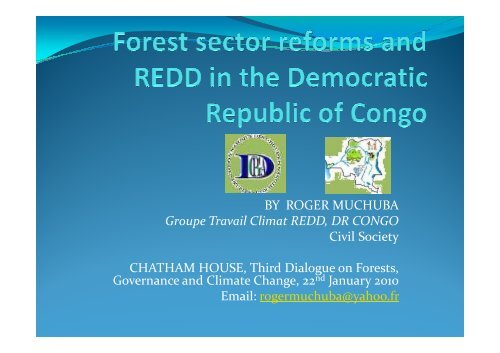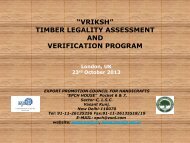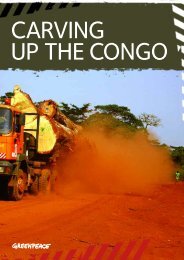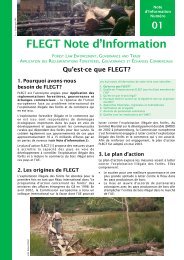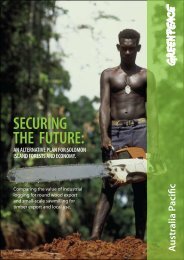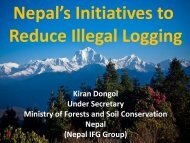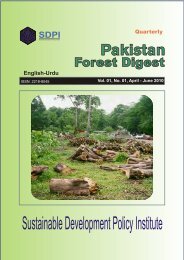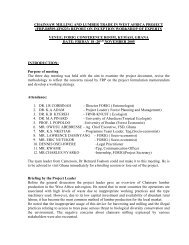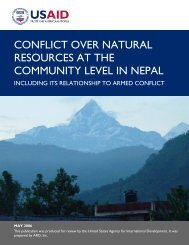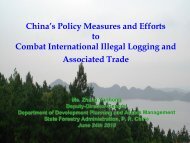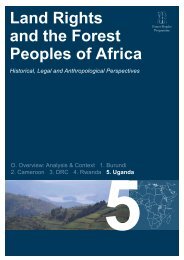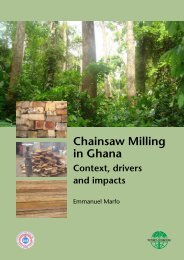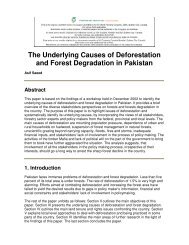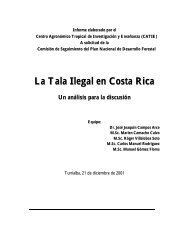BY ROGER MUCHUBA Groupe Travail Climat REDD, DR CONGO ...
BY ROGER MUCHUBA Groupe Travail Climat REDD, DR CONGO ...
BY ROGER MUCHUBA Groupe Travail Climat REDD, DR CONGO ...
- No tags were found...
Create successful ePaper yourself
Turn your PDF publications into a flip-book with our unique Google optimized e-Paper software.
Drivers of deforestation and threats to the forestand forest-peoples in <strong>DR</strong>C Forest policy focused on industrial exploitation and ‘strict’conservation Industrial logging dominated by foreign companies Artisanal logging expanding rapidly History of creation of park sand reserves without consultation oftraditional customary owners of the land Threats to the forest and forest-peoples Profit from logging has not reached communities – poor benefitsharing Concessions to logging and national parks deprive communities ofland and resources - eviction of local communities from their lands Loss of biodiversity Shifting cultivation and gathering fuelwood/charcoal – reflectsproblem in <strong>DR</strong>C state provision of basic services
State policy in Congo Basin• States retain legal rights to all land and national territories inCongo Basin• Customary rights of communities to land and resources notrecognized – therefore insecure land tenure• Congo Basin governments adopted new Forest Codes and otherlegislation - 1980s-2000s• Focused on industrial exploitation of forest and conservation• Legislation related to forest communities not developed orimplemented• No legislation for ‘indigenous territories’ such as those inBrazil• Only Congo Brazzaville to pass Indigenous Peoples law in 2010
<strong>DR</strong> Congo Forest Policy• Forest Code (Code Forestier) adopted in 2002• Supporting legislation on community rights andbenefit-sharing still not adopted• Transitional Government granted 25.5millions of hectaresof logging concessions illegally, 2002-04• Moratorium on new logging forest concessions - 2002• After legal review, illegal concessions cancelled in 2008• Challenge to manage cancelation with transparency• Legal review (2005) showed crucial role of indigenouspeoples and importance to maintain the moratorium• Zoning process – slow implementation
Community-based forestry in CongoBasin• Difference between ‘community-based forestry’ and ‘communityforestry’• Cameroon implemented community forestry• However, onerous administrative process, small concession size andnot related to traditional forest management• Provision in the <strong>DR</strong>C Forest Code for community-based forestry – butno implementation• Currently – debate on community forest law• Proposal to restrict size of community forest to 10,000 hectares, buttraditional areas are often 100,000 hectares• Need to transfer land rights not just management rights over forest• Law is crucial for success of <strong>REDD</strong> process
National <strong>REDD</strong> process in <strong>DR</strong> Congo• <strong>DR</strong> Congo – joint UN-<strong>REDD</strong> and Forest Carbon Partnership Facility (FCPF),World Bank• January 2009 – first joint scoping mission - UN-<strong>REDD</strong>/FCPF• May 2009 – second mission• Presentation of the programme of UN-<strong>REDD</strong> and FCPF• <strong>REDD</strong> National Coordination began operating – government body• October 2009 - third mission• November 2009 - Decree on <strong>REDD</strong> statute gives legal recognition toNational Committee - civil society/Indigenous Peoples/government/privatesector body• December 2009 – McKinsey report on <strong>REDD</strong> in <strong>DR</strong>C• January 2010 consultation on Readiness Proposal Plan (RPP) to FCPF• Overall, good cooperation between civil society and National Coordination• Held workshops in provinces to involve civil society organisations (CSOs)and communities
Challenges for <strong>REDD</strong> in Congo Basin Identifying the real drivers of deforestation and degradation not point communities as causes of forest deforestation How to ensure that benefit sharing is real? Sustainable Forest Management could lead to subsidies forindustrial logging through <strong>REDD</strong> Indigenous and forest peoples must benefit from <strong>REDD</strong> Legal reforms needed to recognise community-based forestry Need to ensure fair and participatory zoning plan How to apply social and environmental safeguards in relation to<strong>REDD</strong>? Focus should be on natural forest not plantation Take into consideration UN<strong>DR</strong>IP specially FPIC (free, prior,informed consent) Governance and transparency in all processes MRV (monitoring, reporting and verification) more than carbon How to build an effective and accessible complaint mechanism? Need to stop projected law censoring civil society
Role of civil society and NGOs in <strong>DR</strong> CongoForest reform Outreach / awareness-raising of the Forest Code and other instruments Promotion of community rightsActivities on the ground Civil society pilot projects on participatory MRV, creating awareness-raisingmaterial in 2010 Developing alternatives to industrial logging (such as payment forecosystem services, non-timber forest products , community-based forestryetc.) Develop participatory mapping, using GPS technology, to help secure landtenureMonitor activities of international organizations World Bank Using the complaint mechanism of Forest CodeSupport independent monitoring of forest governance
Regional and international actors in theCongo Basin Regional and international programmes can improve forest governance COMIFAC action plan (plan de convergence) - 2005 Congo Basin Forest Fund (CBFF) - £100 million – UK/Norway 2008 CBFF managed by African Development Bank (ADB) Congo Basin Forest Partnership (CBFP) now co-ordinated by Germany– 9 landscapes FLEGT – ongoing process between EU and Congo Brazzaville Forest Stewardship Council (FSC) certification – mixed results• All Congo Basin states are party to UN<strong>DR</strong>IP, CDB, ICCPR, ACRHP• BUT no effective application of these instruments
Recommendations for <strong>REDD</strong> in Congo Basin COMIFAC must be engaged on good governance under UNFCCC mechanism to secure funders Develop a specific law on Indigenous Peoples rights, especially to land,territories and resources – good example from Congo Brazzaville Ensure civil society has a strong, independent voice in all stages of the<strong>REDD</strong> process as one guarantee of good governance and transparency Similarly, Parliament and local government must be involved in <strong>REDD</strong>process Develop good partnership between Governments and World Bank,FAO, UNDP, UNEP and civil society World Bank must respect their own safeguard policy (OP4.10) States must respect their international engagements (UN<strong>DR</strong>IP, ICCPR) Need to build a global anti-poverty policy like DSRP document in <strong>DR</strong>C Need to address consumption in developed countries (OCDE link withconsumer countries)


